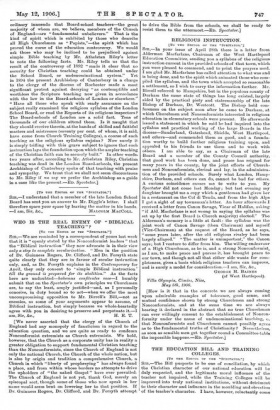THE ALLEGED EXCLUSION OF THE GODHEAD OF CHRIST FROM THE
SYLLABUS OF THE LONDON SCHOOL BOARD.
[To THE EDITOR OF THE "SPECTATOR."] SIM,—In this controversy it is important before all things to be scrupulously exact in our statements as to facts. Canon MacColl was mistaken in saying that the Godhead of Christ was excluded from the syllabus of the old London School Board, and Mr. Diggle was quite justified in correcting him. But Mr. Diggle's correction, taken by itself, may be equally misleading. The actual facts are these:— (1) The Bible, by a rule of the Board, was to be read, and instruction given therefrom in "the principles of religion."
(2) Evidence being brought before the Board that certain teachers thought those principles did not include any funda- mental dogmas of the Christian faith, the Board in 1892 pro- posed (a) to insert the word "Christian" before "principles," and (b) to issue a circular instructing the teachers to be careful to teach the Godhead of Christ and the doctrine of the Trinity. These proposals met with the most determined opposition on the part of the Progressive Party on the Board, headed by the present Lord Stanley of Alderley, and, outside, of Dr. Clifford, the Non- conformists, and the Liberal Press and organisations,—in short, it produced the famous "London School Board controversy." Tho proposals were carried, but the organised opposition of the teachers, who flatly refused to accept the directions of the Board, saying that in their opinion such teaching was objectionable, and that they would teach the Bible as they thought fit without reference to the Board's circular, made it clear that no security for Christian teaching could be obtained under the School Board, or undenominational system.
(3) The syllabus, as many other School Board syllabuses, was very good so far as it went. Although an attempt of mine in the Scripture Sub-Committee to strengthen it in a Christian direction by the inclusion of St. Thomas's confession, "My Lord and my God," was violently opposed as being unfair to the Unitarians, and consequently defeated, Mr. Diggle is right in saying that "neither by inference, nor by explicit statement, was the teaching of the Godhead of Christ ever excluded" from it.
(4) A rule of the Board prohibited inquiry into the religious opinions of teachers. This rule, now to be enforced by statute in all schools, is apparently what makes Bible teaching "simple." It certainly removes any guarantee that it shall be Christian. Notoriously teachers of every form of belief, misbelief, and un- belief are teaching the Bible to children promiscuously in provided schools as they did in the old Board-schools. How will the doctrine of Christ's Godhead fare in such circumstances P That is the question to be faced, and to discuss the merits of syllabuses is nothing ad rem.
The point to be remembered is this : that you cannot get fundamental Christianity from fundamental unbelievers, either with or without the Bible in their hands.
Junior Carlton Club. •
[We must protest against Mr. Atheist= Riley's extra. ordinary innuendo that Board-school teachers—the great majority of whom are, we believe, members of the Church of England—are "fundamental unbelievers." That is the kind of spirit which is exhibited by those who describe all High Churchmen as "Papists,"—the spirit which has proved the curse of the education controversy. We would ask those who may be inclined to be prejudiced against simple Bible teaching by Mr. Athelstan Riley's letter to note the following facts. Mr. Riley tells us that the result of the controversy of 1892 "made it clear that no security for Christian teaching could be obtained under the School Board, or undenominational system." Yet in 1894 the present Archbishop of Canterbury in a charge to the clergy of the diocese of Rochester made a most significant protest against decrying "as contemptible and worthless the Scripture teaching now given in accordance with the law in the Board-schools of London or elsewhere." "Have all those who speak with ready assurance on the subject really examined the religious syllabus of the London School Board, or read the Reports of its religious inspectors P The Board-schools of London are a solid fact. Tens of thousands of our children attend them. Is it naught that they should receive therein, at the hands of skilled and faithful masters and mistresses (seventy per cent. of whom, it is said, have come from Church Training Colleges), a coarse of such teaching as the religious syllabus enjoins ? Now surely it. is simply trifling with this grave subject to ignore that such instruction lays the foundation upon which the ampler teaching of the Christian faith can be securely built." In other words, two years after, according to Mr. Athelstan Riley, Christian teaching was dead in the London Board-schools, the present Archbishop of Canterbury spoke of that teaching with praise and sympathy. We trust that we shall not seem discourteous to Mr. Riley if we say we prefer the Archbishop as a guide in a case like the present.—En. Spectator.]











































 Previous page
Previous page